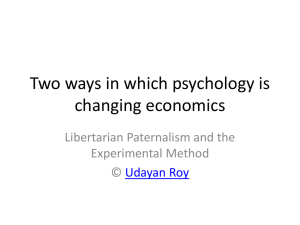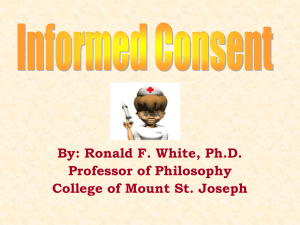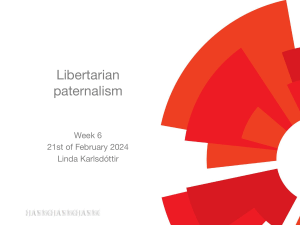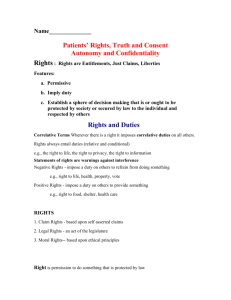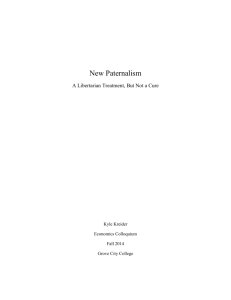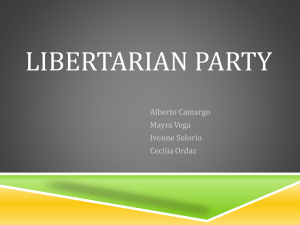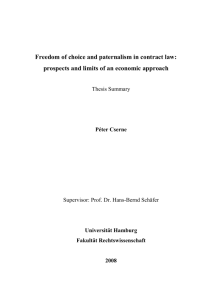When do we need a nudge?
advertisement
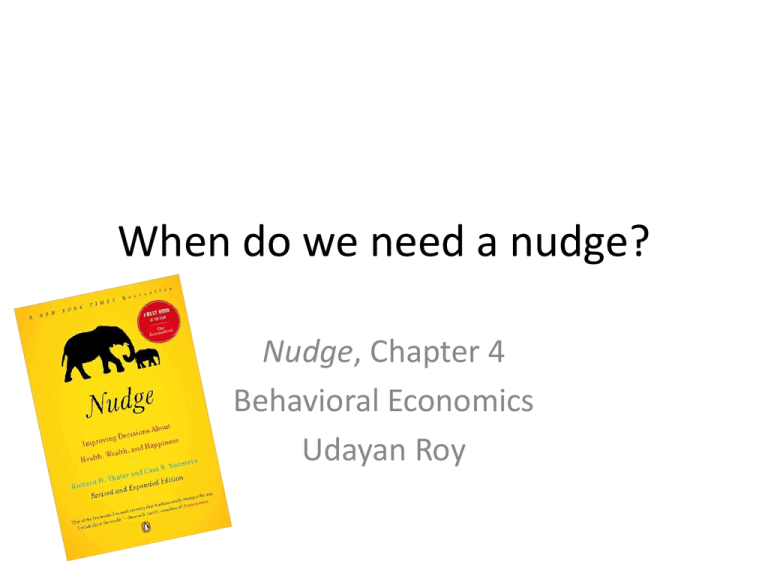
When do we need a nudge? Nudge, Chapter 4 Behavioral Economics Udayan Roy Libertarianism • The standard assumption of rational choice in economics has led to a deep-rooted view that governments should take a hands-off (or libertarian) attitude towards private enterprise and private choice Paternalism • Behavioral economics, with its emphasis on our predictable irrationalities, has instead begun to make government intervention (or paternalism) seem less unreasonable Libertarian Paternalism • In this course, we have emphasized the middle-ground (or compromise) notion of … • … libertarian paternalism! • Under libertarian paternalism, the government nudges private citizens towards rational choices without in any way restricting their freedom to do as they wish Libertarian Paternalism • Under libertarian paternalism, the policy maker (also called the choice architect) tries to influence people’s choices by changing the context in which choices are made but not by changing the menu of available options • The choice architect tries to nudge people towards choices that are obviously rational without making it harder for people to make other choices if they really want to do so The choice architect needs to be cautious • The Golden Rule of Libertarian Paternalism: – Offer nudges that are most likely to help and least likely to inflict harm – Help the least sophisticated people while imposing minimal harm on everyone else Nudge guidelines • The choice architect needs some general guidelines to tell when nudges are a good idea • Nudges are a good idea when – The choices are particularly difficult for most people, and – We cannot rely on market competition to make it easier for people to make good choices DIFFICULT CHOICES Investment goods and sinful goods • When a choice has costs now and benefits later, we tend to procrastinate, to our peril – Investment goods: exercise, flossing, dieting • When a choice has benefits now and costs later, we tend to be tempted into mistakes – Sinful goods: cigarettes, alcohol, fatty foods • For these choices, we often need nudges Difficult choices • Some choices are just very difficult – Which house to buy, what kind of mortgage to take, how much of one’s income should one save, which stocks and bonds to buy, what major should one choose in college • For these choices, we often need nudges Infrequent but crucial choices • Many of our most difficult choices are so difficult because we make them very infrequently • Sometimes difficult tasks become manageable with practice • But in some cases practice is just not possible – You can’t change colleges or majors or spouses or careers or houses or lives too many times • Rare and difficult choices need nudges Repeatable choices without feedback • You’ll learn nothing from practice if there’s no quick feedback about how well you’re doing – Practicing golf in the dark – Being a stick-in-the-mud and not trying alternative strategies – Having to wait and wait to see the results of a choice (dieting) • Here too, nudges can help Groundhog Day • A classic film comedy of the redemptive power of repetition and instant feedback • The entire film is available on YouTube in ten 10-minute parts! – Here’s part 5 Choices with unfamiliar outcomes • When we don’t know how the various choices will affect us, we’d need help to make choices – Unfamiliar cuisine – Unfamiliar courses in a curriculum MARKET COMPETITION Markets: a mixed verdict • When choices are difficult, will those who offer us those choices help us make the right choices? • Will market competition give businesses the incentives to help us make the right choices? • Answer: yes and no! Markets: a mixed verdict • In some cases, market competition helps people make the right choices • At other times, market competition further exploits the irrationalities of people Where the market does not help • First, helping the deluded often requires educating them, giving them more information • But information is a public good; private firms will have no incentive to provide a public good Where the market does not help • Second, if someone can make a living only by ripping people off, market competition will not get him to do something else; all that competition can do is drive his fees down to the cost of his time • And if it is costly for the charlatan’s honest competitors to dissuade the gullible consumer, they will have no incentive to try Where the market does not help • Finally, in some cases competition may simply be absent • That is, it might be difficult for new people to enter a business and compete with the charlatans In some cases, the market helps • There are cigarette companies and there are companies selling nicotine patches • There’s Burger King and there’s NutriSystem • But even here, the government may have a role; it can make it easier for the good guys to compete with the bad guys
